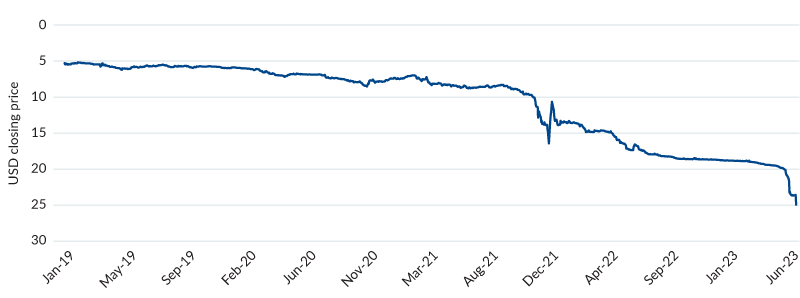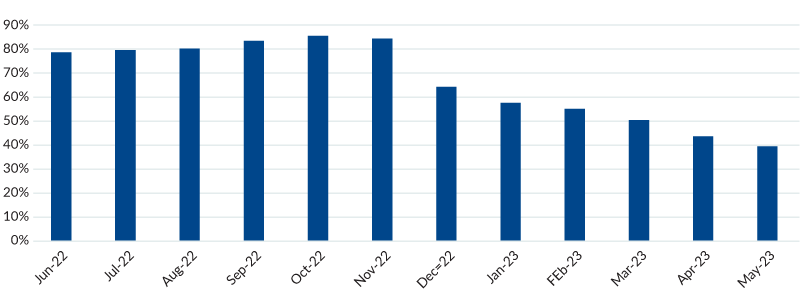Insights
Turkey struggles to prevent currency crisis
Share this article
July 27, 2023 | By Mesirow Currency Management
Weak Currency and Strong Inflation Bedevil Turkey
Unconventional economic policies are making it hard for Turkey to avoid a monetary mess. An economy beset by high inflation, lack of foreign exchange reserves, and ever-changing financial leadership have led to a weak currency that’s likely to become weaker.
Monetary and fiscal policies result in ailing lira
Irregular monetary and fiscal management is reflected in a feeble lira that continues to decline. The lira has dropped almost 17% in June (as of June 22, 2023) and nearly 25% from the end of 2022 (Figure 1).
Worse is feared: according to a Central Bank of the Republic of Turkey survey, market observers expected the central bank to hike interest rates to 17 percent from 8.5 percent in June and the lira to fall 17% in the next twelve months. On June 22, the central bank increased interest rates to just 15 percent, disappointing the market and causing the US currency to rise (and conversely, the Turkish lira to fall) to 24.9 lira per US dollar.
FIGURE 1: USD V. TRY – DAILY CLOSING PRICES | JANUARY 1, 2019 – JUNE 22, 2023

Source: Bloomberg
The mother and father of all evil
Many of the lira’s problems stem from the unorthodox economic policies of the Turkish president, Recep Tayyip Erdoğan. A major issue has been leadership stability. In June 2023 Erdoğan appointed the nation’s fifth central bank governor since 2019; he is on his fourth finance minister in the same period.
Another fundamental problem is inflation, which topped 80% in the autumn of 2022 before declining to just under 40% in May 2023. Conventional policy to reduce inflation would be to raise interest rates, but Erdoğan believes high rates cause inflation, calling elevated rates the “mother and father of all evil”. Some former central bank governors have disagreed; they were replaced with those that think like the president. The result is that interest rates were cut from 19 percent to 8.5 percent in early 2023 before the late June increase to 15 percent. Not raising interest rates further suggests that Erdoğan will handcuff the new central bank governor and finance minister, preventing them from implementing necessary economic reforms.
FIGURE 2: TURKISH INFLATION | June 2022 – May 2023

Source: tradingeconomics.com/turkey/inflation-cpi
Other issues include the costly government support of the lira. In a ploy to encourage citizens and businesses to hold lira instead of foreign currencies, Erdoğan’s administration agreed to protect lira deposits against foreign exchange rate shocks. The government compensates account holders if lira depreciation exceeds the central bank interest rate up to three percent over the central bank rate.
The central bank has used foreign exchange reserves to buy lira to bolster the currency, making it less costly for businesses and individuals to pay for imports. That central bank activity may be ending, however, because foreign exchange reserves are uncomfortably low. Reserves have declined from a high of about $85 billion in late 2022 to $60.8 billion in late June 2023. According to Goldman Sachs, when liabilities are included, Turkey’s net foreign assets are negative. The central bank’s inability to continue to shore up the currency by selling foreign currency and buying lira suggests further weakening of the lira.
Reality crushes hope
Foreign investors had viewed the economic mess with a mix of dismay and hope. Dismay has been represented by the decline of the lira. Hope had been based on the president’s willingness to allow his new economic team the freedom to address the underlying economic problems responsible for the lira’s decline in 2023, a drop that accelerated in June. That hope has been displaced with the reality that the currency is poised to weaken further.
Explore
Get it wholesale
Foreign exchange trades settle two days after trading. Could they settle in 30 seconds?
Read article
Central Bank Digital Currencies
What do CBDCs mean for the US dollar as the world’s major reserve currency?
Read article
Spark
Our quarterly email featuring insights on markets, sectors and investing in what matters
